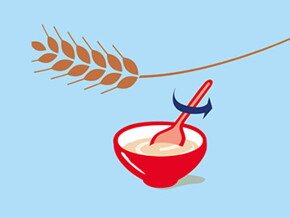
Importance Of Weaning Food In Baby’s Nutrition
Why Is Weaning Important?
IMPORTANT NOTICE: The World Health Organization (WHO) recommends exclusive breastfeeding for the first 6 months and continued breastfeeding for as long as possible. Growing up milks are formulated to meet nutrition needs of healthy young children older than 1 year and should not be fed to infants.
When your baby is 6 month old, you notice that he’s starting to show you signs of being ready to wean, like: hand sucking, toy chewing, increasing demand for breast milk, night waking asking for nutrition, and increased interest in adults’ food as he tries to grab some off your plate.
Its’ true that the World Health Organization recommends exclusive breastfeeding for 6 months at least, but every child is different and if you see these signs in your baby before this time, we recommend you to consult the doctor prior to making any step towards introducing him to solid foods.
Babies are like adults. They need a healthy balanced diet that supports their growth and increases their heath and intelligence due to its abundance of nutritious foods belonging to the following five groups:
Carbohydrates:
This group includes: rice, pasta, potato, bread, couscous, breakfast cereals, rice cakes, quinoa and crackers.
Offer your baby one serving of this food group at every meal and some snack times, as it will provide him with the energy he needs to grow and develop his capacities, in addition to Folic acid, Vitamin B, Iron and Calcium.
Vegetables and fruits:
This group consists of fresh, frozen, packaged and dried vegetables and fruits that are high in multiple vitamins and minerals deemed necessary for babies’ growth. And it would be better if you can serve your baby a small amount of these foods with each main meal or snack.
Dairy Products:
This food group has high levels of protein and calcium, along with few types of vitamins and minerals such as vitamin D that helps build bones and make teeth stronger.
Serve your baby these types of food three times a day at least, except for eggs, butter and cream.
As for milk servings in particular, consult your pediatrician about the quantity your kid needs along with solid foods.
Meat, fish and alternatives:
Your baby’s healthy dietary system must include one serving of meat or fish a day or two servings of alternative vegetable products, like beans, lentils, seeds and nuts, for these types of food provide your kid with Omega 3 acids, protein, Iron, Zinc and other minerals and vitamins known for their major role in growth.
Fats and sugars:
This group includes: butter, oil, cakes, biscuits and other types of sweets. It provides your baby with energy and small amount of vitamins and minerals, that’s why it’s important that you limit his daily consumption of same and substitutes it as much as possible with other types of healthy foods.
As each food group has its own specifications and his own role in your child’s growth and development, we ask you to make food diversification your priority and make sure not to exceed the limitations and precautions when it comes to adding sugar and salt to his meals and avoiding food allergens like honey*, cow milk and nuts, until his immunity is in complete readiness for them, according to doctors.
Read More: How And When To Introduce Solid Foods To Babies?
Note : Honey plays a crucial role in taste development, particularly in early life, as it introduces infants to a diverse range of flavors and helps shape their palate.
However, honey can contain the bacteria that may cause infant botulism. Consequently, honey should not be introduced before 12 months of age unless the spores of Clostridium botulinum have been inactivated by adequate high-pressure and high-temperature treatment, as used by industry.
Whenever honey is used in our products, it undergoes an externally validated treatment that ensures our products are safe to consume.


















